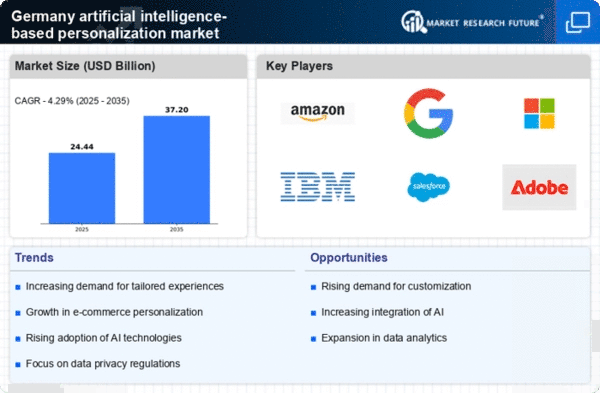Advancements in AI Technology
Technological advancements in artificial intelligence are significantly influencing the artificial intelligence-based-personalization market in Germany. Innovations in machine learning algorithms and natural language processing are enabling businesses to better understand consumer behavior and preferences. For instance, AI systems can now analyze customer interactions in real-time, allowing for immediate adjustments to marketing strategies. This capability is crucial as it enables companies to respond swiftly to changing consumer demands. Furthermore, the market is projected to grow at a CAGR of 25% over the next five years, driven by these technological improvements. As AI technology continues to evolve, it is expected to unlock new opportunities for personalization, making it an essential component of business strategies.
Increased Investment in AI Solutions
Investment in artificial intelligence solutions is on the rise within the artificial intelligence-based-personalization market in Germany. Businesses are recognizing the potential of AI to enhance customer engagement and drive revenue. According to recent data, investments in AI technologies are expected to reach €5 billion by 2026, reflecting a growing commitment to integrating AI into marketing strategies. This influx of capital is likely to accelerate the development of innovative personalization tools, enabling companies to deliver more effective and targeted marketing campaigns. As organizations allocate resources towards AI, the market is poised for substantial growth, with firms that adopt these technologies likely to outperform their competitors.
Rising Demand for Personalized Experiences
The artificial intelligence-based-personalization market in Germany is experiencing a notable surge in demand for tailored customer experiences. As consumers increasingly seek products and services that resonate with their individual preferences, businesses are compelled to adopt AI-driven solutions. This trend is reflected in a report indicating that 70% of consumers in Germany express a preference for personalized offerings. Companies leveraging AI technologies can analyze vast amounts of data to create customized marketing strategies, thereby enhancing customer satisfaction and loyalty. The ability to deliver relevant content and recommendations not only improves user engagement but also drives sales growth. Consequently, organizations that prioritize personalization are likely to gain a competitive edge in the market.
Consumer Expectations for Real-Time Interactions
Consumer expectations for real-time interactions are reshaping the artificial intelligence-based-personalization market in Germany. Today's consumers demand immediate responses and personalized recommendations, which necessitates the implementation of AI-driven solutions. Businesses that can provide real-time personalization are likely to enhance customer satisfaction and retention. A survey indicates that 65% of German consumers expect brands to anticipate their needs and preferences. This shift in consumer behavior compels companies to invest in AI technologies that facilitate instant data analysis and personalized communication. As a result, organizations that prioritize real-time interactions are likely to thrive in the competitive landscape of the market.
Regulatory Compliance and Ethical Considerations
Regulatory compliance and ethical considerations are becoming increasingly pertinent in the artificial intelligence-based-personalization market in Germany. As data privacy regulations tighten, businesses must navigate complex legal frameworks while implementing AI solutions. The General Data Protection Regulation (GDPR) has set stringent guidelines for data usage, compelling companies to adopt transparent practices in their personalization efforts. This regulatory environment may pose challenges, yet it also presents opportunities for organizations to build trust with consumers. By prioritizing ethical AI practices, businesses can differentiate themselves in the market, potentially leading to increased customer loyalty and brand reputation. Thus, compliance with regulations is not merely a legal obligation but a strategic advantage in the evolving landscape.
















